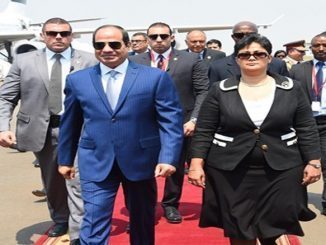
Egyptian regime’s recent attempts to entrench authoritarianism into the constitution reveal the regime’s fear rather than power. The changes could precipitate the most significant challenge that military strongman Abdel Fattah al-Sisi has yet to face as president.
In theory, the proposed amendments would simply extend the presidential term from four to six years. However, a special article that only applies to the current president would allow Sisi to run twice more for six years each time, potentially giving Egyptians yet another president for life over the next two decades.
The proposed amendments would also allow Sisi to appoint judges to Egypt’s highest courts and bypass judiciary oversight while further extending the jurisdiction of military courts over civilians.
Trajectory Towards Authoritarian Rule
On the face of it, this seems like a dramatic power play. However, these latest moves to extend the presidential term, consolidate military power, and limit judicial oversight are simply formalizing a much longer trajectory towards authoritarian rule since the army removed the Muslim Brotherhood President Mohamed Morsi from power in July 2013.
Four months after Morsi’s removal, protests without a permit were outlawed, with many high-profile activists associated with the 2011 Revolution arrested and imprisoned. After the assassination of the state prosecutor in August 2015, the government introduced a new terrorism law, with unprecedented measures to gag the media and impunity for security and military personnel waging Egypt’s “war on terror.”
Observers have recorded exceptional numbers of political prisoners, mass death sentences, and dramatically increased numbers of enforced disappearance and cases of torture. The Egyptian Commission for Rights and Freedoms documented at least 1,500 enforced disappearances between 2014 and 2018. A staggering 17 new prisons have been built to accommodate Egypt’s imprisoned population.
Crackdown
Amnesty International has documented the dramatic crackdown on the media in Egypt in the last year alone. In the 4-year time span between 2013 and 2017, the authorities imprisoned 11 journalists. By comparison, between December 2017 and September 2018, the regime detained at least 28 reporters. This dramatic increase in such a short time in recent months suggests that authorities are feeling particularly uneasy about any challenge to their power.
Draconian measures have been justified in the name of protecting “the people” from terrorism and safeguarding Egypt’s territorial integrity and national security. Initially, the military and its supporters portrayed the army’s 2013 removal of Morsi as the salvation of the revolution, but since then official and media narratives have reframed the 2011 uprising as a longstanding conspiracy to destroy the Egyptian state.
The nation has been cast to be in a permanent state of emergency, threatened by a homogenized coalition of the Muslim Brotherhood, Islamist insurgents, and foreign governments. The national hysteria is perhaps best testified by the fact that in January 2018, the Ministry of the Interior released a cartoon inciting Egyptian children to bypass their parents and report anything “suspicious” directly to the police.
Of course, the narrative of a nation under threat from foreign machinations has historical precedents and is deeply rooted in Egypt’s postcolonial past.
Since the founding of Egypt’s republic in 1952, the military regime led by Gamal Abdel Nasser sought to legitimize its authoritarian politics with the justification that foreign powers were trying to destabilize the region and undermine Egypt’s territorial integrity. The 1956 invasion of Suez, for example, consolidated legitimate fears of international meddling in Egyptian affairs.
Indeed, according to former Justice Minister Mohamed Amin al-Mahdi, Sisi’s proposed amendments hark back to a set of decrees issued by Nasser in 1969, granting the president sweeping powers over the judiciary. Admittedly, Egypt was in a state of war against Israel following the crushing defeat it suffered in 1967, thereby justifying such emergency measures in the eyes of the public. Nonetheless, Nasser’s moves came to be known in legal circles as the “massacre of the judges.”
Response to Constitutional Changes
The response to the constitutional amendments among the Egyptian people has been small in scale but significant. Emulating aspects of the horizontal mobilization that propelled the 2011 Revolution, ordinary people have once more taken to social media document their protest against what they call a “constitutional crisis.”
Egyptian Nobel Peace Prize winner Mohamed ElBaradei concisely surmised the moves on Twitter as the “Arab Spring in reverse.”
Today, however, the authorities are better placed to police this virtual space.
In August, the government passed a law tightening internet controls. The legislation on “cybercrime” gives police and investigative authorities the power to monitor and block websites that “constitute a threat” to Egypt’s national security or economy. People whose social media accounts have more than 5,000 followers could be placed under supervision. Before this law, authorities had already blocked over 500 websites.
History Repeating Itself?
Ultimately the regime might recall that it was precisely a similar attempt to extend presidential powers and sideline the judiciary that incited the beginning of the end of Morsi’s rule.
The “Tamarod” (rebel) campaign that brought Sisi to power began with a similar “constitutional crisis” in November 2012. While evidence has since emerged that the Egyptian intelligence services played an important role in mobilizing the Tamarod campaign within Egyptian civil society, there was also much legitimate anger among the people towards Morsi’s attempts to shape the constitution in his favor.
As the nation’s military strongman, Sisi has cultivated significantly more support than the former president, drawing on a carefully curated cult of personality and the army’s symbolic status in the hearts and minds of Egyptians. Nonetheless, he would be loath to forget the fate that befell his predecessor.
By Dina Rizk. The article was published by The Global Post on 15 March 2019.



